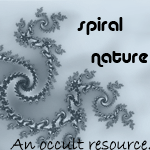“Celebrity” occultists
By Psyche | August 25, 2008 | Print This Post | E-mail This Post | 7 Comments
 Previously we’ve looked at the hazards of dismissing someone out of turn simply because they’re deemed “too popular“,1 but how do they get that way in the first place?
Previously we’ve looked at the hazards of dismissing someone out of turn simply because they’re deemed “too popular“,1 but how do they get that way in the first place?
Recently on a forum someone inquired as to whether there were any “world renowned” LHP practitioners “like what Phil Hine is for chaos magick”. This struck me as odd on at least two accounts.
Certainly, Phil Hine has written several well received books about chaos magick (namely Condensed Chaos and Prime Chaos), but why does Hine, for this person, serve to represent chaos magick?
Within the admittedly niche subject of chaos magick2 there are a variety of influential authors who have published a number of excellent books on the subject, such as its founders Ray Sherwin and Peter Carroll, as well as Lionel Snell (under various pseudonyms) and Stephen Mace, to name a few. Why was Phil Hine singled out?
Is it the relative scarcity of available books/material on the subject that lead to his fame? The simple ease of his writing style? Or perhaps it his early and active participation in ‘zines, mailing lists, his website?
On another blog, Experiments of Magicians, Aleister Crowley is a recurrent target for Taylor Ellwood, who writes:
My original issue with Crowley essentially boils down to this: If after seventy years since his death, Crowley still represents the pinnacle of occultism, then occultism as a discipline hasn’t advanced at all, which then brings up the question as to why any of us even bother practicing magic at all, if all we’re trying to do is emulate him.
It’s only been sixty years, and I don’t think “emulate” is quite the right word, but it remain that here Crowley is viewed as the “pinnacle of occultism”.
Crowley certainly left a trail: mountaineering records, serving as the prophet of a newly defined religion, authoring more than fifty books on magick, as well as poetry, plays, political and philosophical commentary; further, he left various scandals in his wake. It’s easy to see where the initial infamy arose, and the endurance?
Ellwood frequently laments that his favourite authors are not half so well known. Why isn’t anyone talking, writing, lecturing about them, teaching their works?
I don’t have resolutions for the questions above. Hine and Crowley are wildly different. “World renown” and the distinction of being the “pinnacle of occultism” seem abstract, but the weight of authority carried is tenable. It’s a curious game.
I might have an answer, though, in regards to well known (if not quite world renown) LHP practitioners. Don Webb springs immediately to mind, and the late Christopher Hyatt likely qualifies. Anton LaVey and the current head of the Church of Satan, Peter Gilmore. Also the head of the Temple of Set, Michael Aquino. Stephen Sennitt, certainly.
Where do these names lead? Wouldn’t a recommendation for specific works to study, biographies to read, people to practice with be more useful than name dropping?
Footnotes:
- See, “Too popular?“. [back]
- Often called the “fringe of the fringe” of occulture. [back]





I think a few factors are at work here — including the fact that many occultists are glad to practice their craft without ever seeking fame or recognition for accomplishments or inventiveness. The thing is, if everyone’s supposed to be innovating, then in some ways there’s no innovation in innovation, you know?
At the same time, there are many well-known occultists — within occult circles — but many find it distasteful to be the kind of bombastic showman that Crowley was, or that LaVey was in more recent years. For that kind of “household name” recognition you need newspaper scandals, not reams of well-written grimoires. And I don’t think many want to go the Paris Hilton route, as it undermines credibility (in many ways, it undermines Crowley’s — to this day).
True, but for those who have attempted to put something out there, what sort of recognition do you think might they expect or desire for their work and name?
Take yourself for example, you’ve published a well written comprehensive book about ley lines in Sonoma. Anyone interested in the subject who reads it will come away with a better understanding of Sonoma County and ley lines in general.
It’s a niche subject about a niche location. You could be a celebrity in your field without goat sex or blood drinking, but what tips the scale?
Specifically, I think it has a lot to do with the charisma and pushiness of the author — you have to have a pretty specific personality type to be a “celebrity,” and I don’t have that personality type. Nor the marketing team to make people think I am.
For comparison, let us consider that to many, the most famous ‘magician’ in Britain is Kevin Caerleon! Being competent – even innovative – is not the same as being a publicity hound. And being famous don’t mean you’re any good.
I suspect a lot of the truly able modern workers are famous as a side effect rather than a primary interest (unlike dear old Kev!).
Also, even the idea of a spokesperson/representative for Chaos magic seems a little… counterintuitive. Absolutely, recommending works rather than writers… even RA Wilson (for example) had his off days.
I hadn’t heard of him before the piece posted on The Wild Hunt, but since then he seems to be cropping up everywhere! “Tacky” doesn’t begin to cover it.
I don’t know that Phil Hine sees himself as a spokesperson, but someone seems to see his work as such.
It does seem to miss the point…
Just a reminder for those who might read the comments here:
“I admit that my visions can never mean to other men as much as they do to me. I do not regret this. All I ask is that my results should convince seekers after truth that there is beyond doubt something worth while seeking, attainable by methods more or less like mine. I do not want to father a flock, to be the fetish of fools and fanatics, or the founder of a faith whose followers are content to echo my opinions. I want each man to cut his own way through the jungle.” -Aleister Crowley
Regarding Taylor Ellwood’s comment on Crowley: I think that distinctions should be made between the terms, “Occultism,” and, “Magic.” I’m not sure I understand Ellwood’s use of the phrase, “…occultism as a discipline,” as there are numerous occult disciplines. However, as for magic, Crowley defined it, “Magic is the science and art of causing changes to occur in conformity with will.” Within the context of this definition, Ellwood is only partially correct. Fundamentally, magic has not advanced at all, not only since Crowley, but also since Israel Regardie, Dion Fortune, Eliphas Levi, John Dee, Henry Cornelius Agrippa, Abramelin, Hermes Trismegistus and even all the way back to Adam. So, why do I, “even bother practicing magic at all?” Firstly, I am not just trying to emulate Crowley. Crowley is not even one of my favorite magicians. Instead, I would define myself, in part, as a Jungian intuition type and, therefore, find magic mental masturbation at its finest. I approach almost everything in life from a magical mindset. Whether it works or not, (and for me it has), I find it creative, artful and fun. But, more importantly, in opposition to Ellwood’s point of view, though the fundamental purpose of magic has not advanced, the systems and paradigms for effecting change do continue to develop and advance. In just the last 20 years or so, with the inception of the Internet, magicians have added the very powerful, “Information Paradigm,” to their arsenals for effecting change. And, with the introduction of, “Chaos Theory,” in physics, magicians have access to a new, “System,” of magic (or rather, “non-system,” whatever the case may be). Today, almost anything can be used as a magical paradigm. I recently saw a made-up term, “Walk-omancy,” as a method of divination. So, in this respect, I disagree with Ellwood’s view that occultism and magic are not advancing at all. Personally, I find these ever-advancing and evolving paradigms fascinating and enjoy trying to integrate them into my own magical workings as well as making up my own. In his book, The Origin of Consciousness in the Breakdown of the Bicameral Mind, Princeton psychologist, Julian Jaynes, made a rather convincing argument that human consciousness is only about two or three thousand years old and probably developed as a defense mechanism for the purpose of survival. Chic and Sandra Tabatha Cicero have often written of, “the overlap between magic and psychology,” and how the two fields are presently validating one another. Perhaps Crowley’s definition of magic is getting a bit weatherworn. Perhaps it’s time to update Crowley’s definition so that it reflects the goings on in more modern times. If psychology is, in part, the study of human consciousness, then perhaps magic can now be defined as, “a utilitarian application of consciousness,” or, more simply put, “using one’s brain to control one’s environment to one’s own advantage.” More than a century ago, magician, Eliphas Levi, pointed out in his book, Histoire de la Magie, the correlation between magic and the Christian Holy Bible’s book of Genesis. As the story goes, God gave man dominion over all of the other species in the kingdom. Perhaps it is consciousness, which is more or less unique to man, and man’s capacity for the utilitarian application of it that gives him, “dominion,” over the other species. In closing, it is not at all my intention to offend anyone on this blog. But, I must say that I find it rather astonishing how little studied the comments are. I don’t think it’s a matter of lack of literature on the topics at hand, nor do I think that the occult and magic are not progressing. More so, I think it’s a case of limited perspective. Magic and the occult have not stopped with Crowley. Rather, they have progressed far past Crowley. It would seem ridiculous for me to study American history only up until the year 1960 and then to posit that nothing significant has happened in America since 1960. Just because I stopped studying after a certain point doesn’t mean that things have stopped progressing. For whatever it’s worth.
Jeff Kunkel